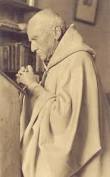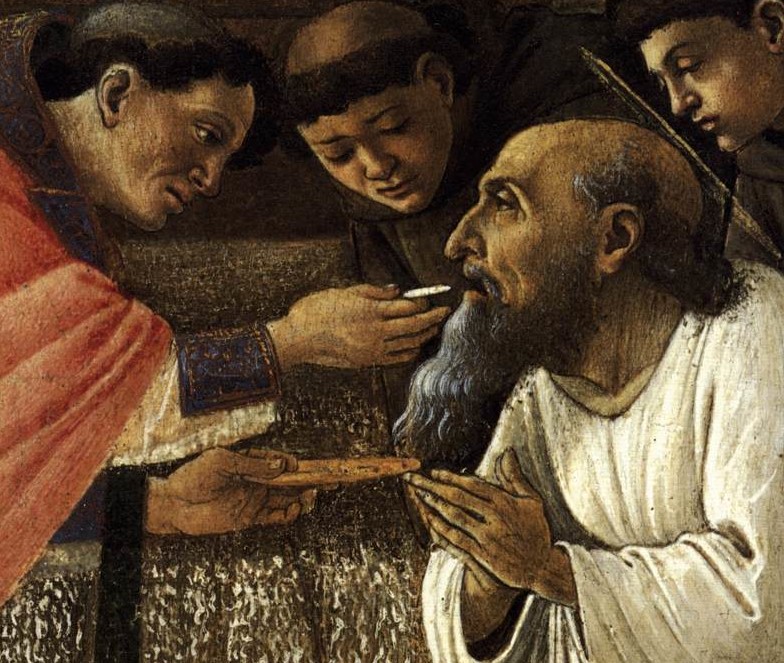After a strong contemplative declaration posting, my first studies led to cautionary reading. In the past, I abused the spiritual life through escapism. Unable to cope with the world, unable to truly humble myself, suffering from the existential neurosis of feeling misunderstood, adrift and self-deceived as different, I shunned the world. Wounded, broken and hurt, I isolated. Meditative prayer is a natural tendency, a place I easily recede to. I can sit silent, quiet before the Eucharist hour upon hour. However, there is a perverse form of selfishness through such efforts. What I read by Abbot Lehodey, declared personal concerns.
“Repose and tranquility are eminently conducive to regular observance and the interior life. They give us an opportunity of attending at leisure to our own souls and of keeping ourselves uninterruptedly united to God. We may become inordinately attached to them, so that we feel a certain difficulty in renouncing them when we have to fulfill the duties of our office or devote ourselves to the service of the community. The love of repose and tranquility, very legitimate in itself, is then excessive, has degenerated into a selfish egoism. It is no longer disinterested or devoted. Consequently, it extinguishes the flame of true charity and renders us useless alike to ourselves and to others”. –Abbot Vital Lehody

For myself, the difficult part is working within the world. There lies my true challenge: to abstain from alcohol, to be small, humble, and happy with and in the world. To dialog, interact, to be open and giving, equates to spiritual effectiveness. Over the last several months, I have returned to playing basketball at fifty with a remarkable group of men over sixty. Intensely, twice a week, every week, we compete on the basketball court like teenagers. The competition, camaraderie, and exercise have become essential to my well-being. The natural life is where my spiritual life can expand or stagnate. Remaining unattached, I vigorously make myself vulnerable to my surroundings, delighting in humiliation and struggle rather than glorification and advancement. Answers to real life problems, not to be a character, extreme, weird or awesome, not to withdraw and isolate while not seeking attention, to reveal practical solutions, contentment in consistency through routine and schedule, to live an ordinary life through ordinary achievement is where my spiritual life is truly nurtured.
A dear friend always stresses that the spiritual life is not my challenge. The natural life is where my deepest battle exist, where ultimate victory is to be attained. Ordinary life is very difficult for me. In my young adulthood, I thrived in dramatics, chaos, and efforts of grand artistic statements. Everything had to be sensational and orientated toward grandness. Restless, irritable, and discontented, life was boring, while lived to the extreme, an existential puzzle manipulated by my schemes and dreams, accountability never a factor due to my unique status as a man of distinct credible insight. Yet strangely through all those years of self-negating, figuring out who I was not, I loved God. I truly did. Misguided, it was not of my doing. All glory goes to God. I will also note Our Blessed Mother truly watched over me, tolerating my wandering, making herself known in a manner I could never refute. She never allowed me to immerse myself too deeply or irretrievably into mortal sin. She assisted in establishing decades of chastity, purifying in areas I was willing to engage temptation. Left to my own devices, I would have wrecked havoc onto my soul, complexly for the sake of experiencing the world as an intellectual artist. I can never deny Her, eternally I am Her’s. The Queen of Heaven is powerfully majestic and tender, a mightily merciful dispenser of grace.
Lyrics from a rock song, ‘The Wake Up Bomb’ by REM come to mind. Astray, a dangerous mind wounding himself in an effort of trying too hard at things that should never be achieved-he stomps, sings, and dances about in places angels fear to tread, and still, reflecting, Michael Stipe possesses a soul wrenching ability to express himself. Something I am convinced of regarding the modern artistic mind is its embracing of the ideology that the end justifies the means. A pop culture icon like Jimi Hendrix is revered when in truth his life is a tragedy, possibly leading to eternal damnation. We are more than children playing with the gift of life. I am always marked by the fact that walking through a museum the artwork becomes grotesque, lacking beauty, complex and convoluted as one advances in centuries. The more we center into the modern mind the more everything beautiful is destroyed. Observe the popularity of piercings and tattoos, the level of ugliness individuals are willing to descend to in order to be unique, to establish an identity. In modern times, it is conformity to be different and extreme. Everybody is doing it. Satan runs riot in the modernistic mind. Beauty and artful presentation give way to self-conscious individual attempts at revelation. It is more important to be somebody, rather than to become something authentic and profound. If one’s creative effort destroys one’s peace of mind, the state of the soul, one’s appreciation for true beauty, all is for naught, simply glorified exercises in errant behavior, a perversion. The idea of genius being tortured, Van Gogh cutting off an ear, is a perversion of ideology, perilous for self-conscious ambitious sensitive immature minds. It is a personal conviction, yet I am of the mindset that self-consciousness is even more dangerous than pride. So many are ecstatic to be famous when they should be content with being nobody. The overwhelming desire to establish identity annihilates. The truth may be the two, pride–the greatest of sins and self-consciousness, are so closely intertwined lines of demarcation do not exist. The recovery world perfectly tags the cliche: ‘ego maniac with an inferiority complex’ Self-consciousness is living in a state of insecurity, low self-esteem that forces one to be in constant collusion with the world. If one attains power under such aberrant conditions they only become more confusion in a confusing world. The noise level only increases. It is evident in religious circles, amongst those striving the most strenuously toward holiness, the obstacle self-conscious individuals present. Prevalent in attack mode minds, these individuals instantly criticize others, desiring to prove how wrong others are, or more accurately trying to establish their righteous identity by the smashing of all other identities. Opposite of submitting to trust, reliance upon Divine Will–faith, hope, and charity; honest, open, and willing when sharing with others, willing to be wrong, self-conscious individuals are forced to struggle with the infliction of personal will. If those I support and encourage are only those who promote my delusion I curse myself. That all said here are Michael Stipe’s lyrics.
I had to knock a few buildings over
I make an ugly mess
I had to blow a gasket
Drop transmission
I had to decompress
I had to write the great American novel
I had a neutron bomb
I had to teach the world to sing by the age of 21
I wake up (I wake up)
I wake up (I wake up)
I threw up when I saw what I’d done
As I celebrate extraordinary achievement through the astonishing Philippe Petit, let me also reign matters in, by recognizing my need to settle lovingly, comfortably within the ordinary. My friend, Ann Marie, always points out that Saint John of the Cross, my dearest saint, was known as an ordinary religious, unassuming in appearance with his diminutive size. A man I saw as the mystics of all mystics was in daily appearance and behavior a very ordinary man. A man who experienced within himself the superessentially extraordinary was in all practical matters extremely ordinary.







Recent Comments